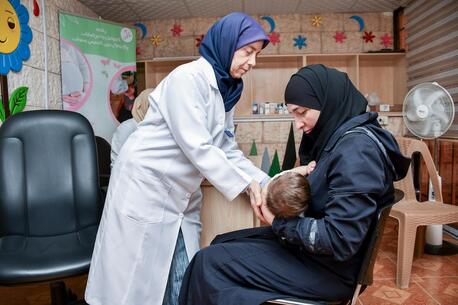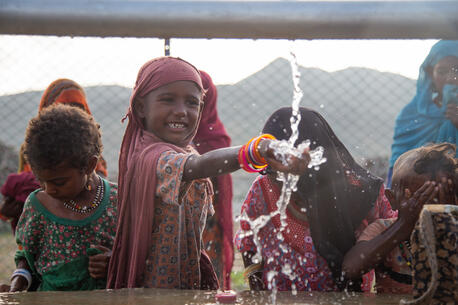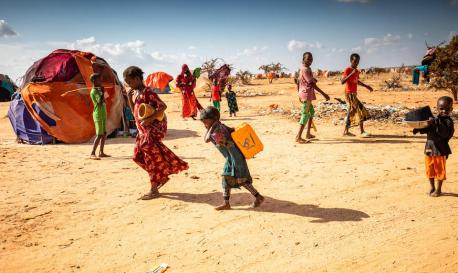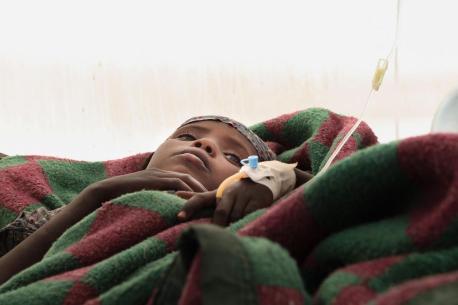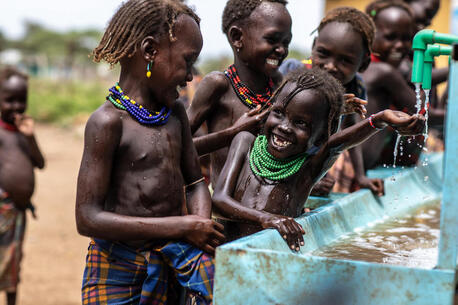
UNICEF in Ethiopia
UNICEF is reaching children in Ethiopia with safe water, nutrition, protection and other critical support. But the effects of severe drought combined with fallout from a brutal armed conflict has added urgency to the mission. Learn more, including how to help.
Multiple humanitarian crises for children in Ethiopia
A series of failed rainy seasons and an El Niño-driven drought have intensified needs in Ethiopia — especially in Tigray, a region that has long suffered the impacts of a violent conflict that left hundreds of thousands of people displaced.
Crop yields are down, driving food insecurity. It is estimated that as many as 1 million children are at risk of acute malnutrition. Outbreaks of cholera, measles, dengue fever and malaria across the country — killer diseases that are easily preventable — are further complicating the situation and further endangering already vulnerable children and families.
UNICEF is on the ground in Ethiopia working with partners to deliver lifesaving support and protection to those most in need. But more donor funding is needed to scale up the humanitarian response.
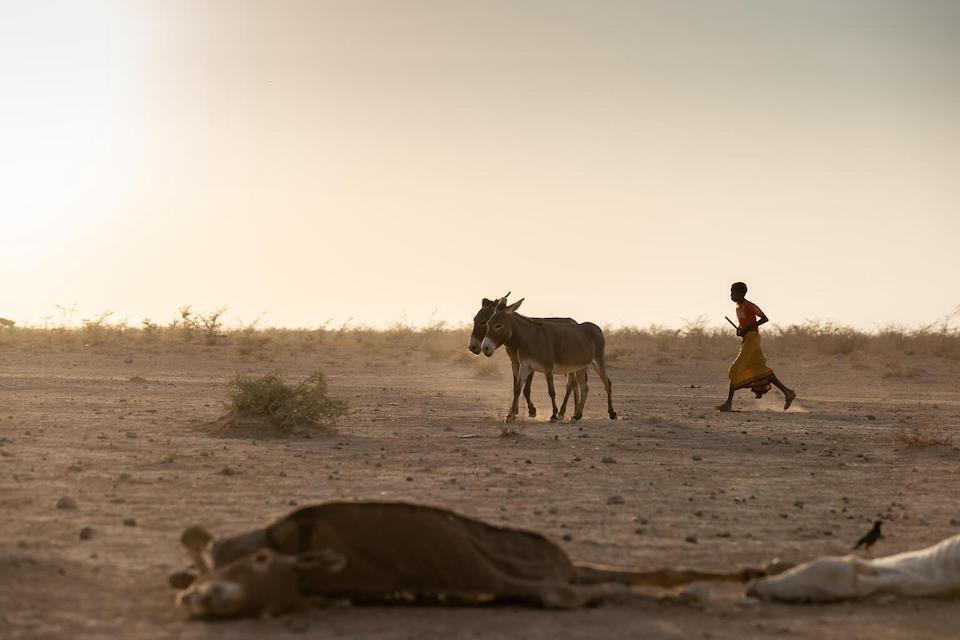
The Tigray conflict's legacy: war crimes against women and girls
Many atrocities were committed against civilians during the Tigray conflict — including rape and sexual violence perpetrated on what the UN Human Rights Council deemed a "staggering scale." All sides were to blame; Tigrayan women and girls were targeted by Ethiopian and Eritrean forces as well as regional militias.
The Council reported on these and other war crimes in Tigray by the Ethiopian government and its allies, noting that they had severely restricted humanitarian access to the region, denying some 6 million people access to basic services for over a year and using starvation as a method of warfare — tactics that left 90 percent of the population in need of assistance.
Children and women throughout Ethiopia remain at high risk for protection concerns and other harms. Violent clashes continue to be reported, along with multiple disease outbreaks and large-scale population displacements. There are ongoing climate shocks and stressors, and new refugees coming in; Ethiopia is already home to 900,000 refugees, more than half of them children, from Sudan, South Sudan, Somalia and Eritrea.
UNICEF's top priority in the country is to prevent suffering and the loss of life while working with local, national and global partners to develop the resilience of communities most at risk.
How UNICEF is helping children in Ethiopia
UNICEF continues to focus its humanitarian response in areas affected by violence and drought. Alongside partners, UNICEF works to reach displaced families as well as those who return home to rebuild their lives.
Key interventions include mental health and psychosocial support; family tracing, reunification and alternative care for unaccompanied and separated children; and supporting the disarmament, demobilization and reintegration of children associated with armed forces and armed groups.
Other UNICEF efforts in Ethiopia include:
- Treating and preventing malnutrition: UNICEF remains the world's largest single procurer Ready-to-Use Therapeutic Food (RUTF), a nutritious peanut paste and highly effective treatment for child wasting
- Improving access to safe water: UNICEF continues to truck in safe water as an emergency measure while upgrading water systems with solar power
- Protecting against disease: water scarcity has led to outbreaks of waterborne diseases like cholera; UNICEF helps prevent the spread by improving sanitation and distributing hygiene supplies. As part of its emergency care and child immunization services, UNICEF is also distributing an oral cholera vaccine
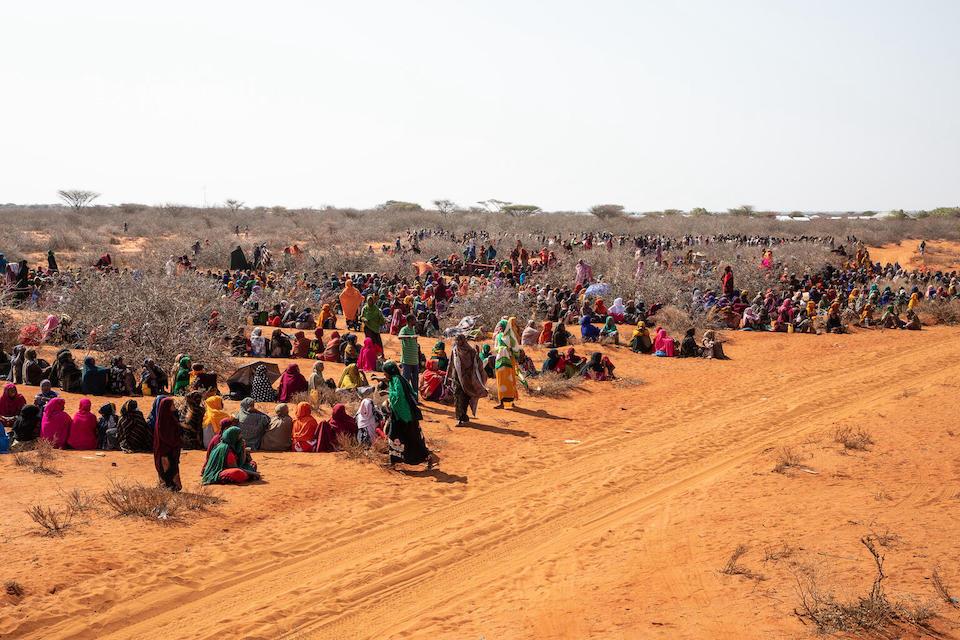
Helping kids get back to learning and child protection go hand in hand
Millions of school-age children in Ethiopia are out of school. In Somali and Oromia regions, for example, students often have to drop out so they can help fetch water — often traveling long distances — or look after other children or livestock while the adults try to find water for their families and cattle.
Children who are out of school are at risk of exploitation as families are pushed into dangerous coping mechanisms. Migrant and displaced children who are out of school are more vulnerable to being forced into child labor or pressed into early marriage, or subjected to human trafficking. They face an increased risk of gender-based violence and exploitation. All have lasting physical and psychological effects.
Getting kids back to learning goes hand in hand with child protection. UNICEF provides education — in both formal and informal settings — across Ethiopia's emergency-affected areas, by setting up temporary classrooms at displacement camps, reopening schools, providing learning materials and training teachers, among other measures.
Protecting children's rights
Children on the move and children caught in conflict and other crises are also often at high risk of exploitation and abuse. UNICEF works closely with Ethiopia's regional governments, providing financial and technical support to strengthen protections for children, while raising awareness of the perils of child marriage and child labor and the importance of keeping kids in school.
UNICEF works in over 190 countries and territories to help ensure children are healthy, educated, protected and respected. Unrestricted donations give UNICEF the flexibility to direct resources to the most urgent needs.
Support UNICEF. Your contribution can make a difference. Donate today.
